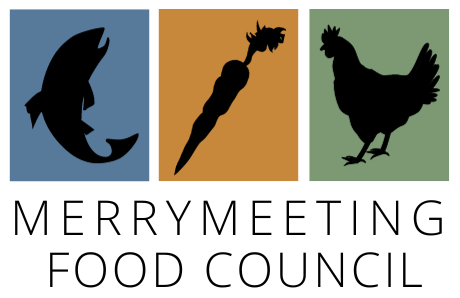Dave Asmussen, Owner/Operator of Blue Bell Farm in Bowdoinham
Why am I doing what I’m doing? Cold, hard, cash.
All crassness aside, I am running a business doing what I love to do, and doing something that I believe is good for my family, friends, neighborhood, and if I’m feeling particularly positive, the planet. But, it’s not totally altruistic, this is driven by our community’s purchasing choices, or where you are “voting” with your dollars, because if I’m not getting paid for it, chances are I’m not going to do it. Maybe I actually agree with the Citizens United decision that money is speech: I love growing black radishes, but I heard through your dollars, that you don’t want them anymore.
Now on paper, growing food seems like a fall off a log easy business plan. You purchase seeds for pennies, your biggest inputs come from the sky, and the product (which has a built in obsolescence of a week or less) is something that everyone on the planet needs, 3 times a day, or they’ll die.
So why are the profit margins so short and the hours so long?
Put simply, the lure of cheap and mass produced convenient alternatives are irresistible to your daily votes.
Confession time, just a few days ago I was at Trader Joes loading up for the holidays with peppermint Jo-Jos (which, if you haven’t had them, they’re like Oreos spiked with crumbled up candy canes, and they’re delicious) and since I was there I got some milk, and cheese (pre shredded for our lasagna), a bunch of pre-sliced deli meats and a thousand other food items where I know not a single dime is going to head back into our local farm economy. But, my time is precious, and I didn’t want to make another stop (or pay more money) for Milk from Tide Mill. Winter Hill cheese is outstanding, but I wanted boring mozzarella, and disassembling one of our homegrown chickens for my kids lunch before the bus comes is not going to happen.
I like to think this shopping foray was an exception, but it’s not, even for someone that lives and breathes in the food world every day. I am grateful for every single customer that comes by my farmstand in the summer, and here I am not being a good customer to my neighbors, instead I’m voting for the faceless industrial farm across the country. The fact that these cheap conveniences are available to us is simultaneously amazing and frustrating. I know exactly how many resources go to produce a single slice of sandwichable chicken, and here it is vacuum packed for an insultingly low price. (I didn’t buy the chicken, I got ham). But this is the reality that people experience and may have no occasion or ability to question otherwise. It’s amazing! It’s easy! It’s cheap! The vast mechanized and sprawling food system is a battleship, formidable, seemingly unstoppable, and a marvel to itself. This is the “get big or get out” system cultivated by Earl Butz, our secretary of Agriculture in the 70’s. He grew up in the great depression and saw Americans starving; yet by the time he left his post, he had put in place a system that would result in the obesity epidemic of today. He rightly claims that because Americans only spend 10% of their income on food, we spend it on other stuff, driving our globally affluent economy in other ways that improve our standards of living. As Americans we don’t have to worry about if there will be food in the actual grocery store, and very few of us have to get up before sunrise to take care of farm chores. Grandpa Butz would have been proud, seriously.
But, like a battleship, our global food system is slow to turn and has overshot its original goals. Nobody on the battleship is aware of the waves of impacts when a product arrives from across the country and so a local cannery closes, or of the families that fell off the back and can’t access food. A romaine recall that crosses 10 states is a good reminder that our local, vibrant, and nimble, and resilient farm economy has an intrinsic value at odds with the global system.
Converse to the battleship, on the way here I get to drink in the view of Goranson Farm stretching down the Eastern River, knowing that the sweet potatoes I bought are a small part of keeping this scene alive. That was a simple vote. Buying bacon from Chance at Otter Farm is a vote for another young farm entrepreneur just one town over from where I live. I want to vote for those businesses that make real impacts on our daily existence. Businesses that employ our neighbors, keep our farmland active, and provide safe healthy food. The “Butterfat Palaces” in northern California, and stone walls in New England, are a testament to when our close link to the food system was a driver of the local economy and more of the family budget went to food, and less to corporate executives.
Perhaps we need to go corporate and rebrand and up-sell our job description: ahem, “we activate genetic code using photons and dihydrogen oxide in an organic and mineral matrix to generate complex carbohydrates and amino acids to sustain life on the planet.” Oh, I mean we’re farmers.
No, I think we’re on the right path building our local, meaningful relationships between producers, processors and consumers. If we can coordinate the amazing resources available to us, our businesses can thrive, and when local businesses are making real money, we’ll continue to see positive changes in our local communities. We just need to use the 3 votes available to us every day; breakfast, lunch, and dinner.
